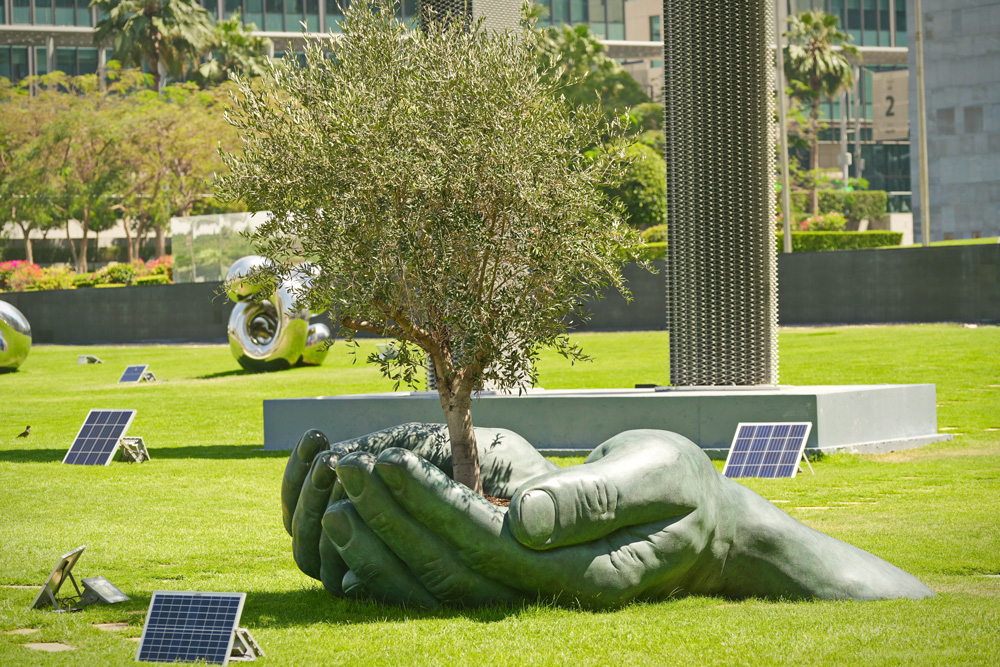Not all emission reduction goals should be created equally
With only three countries in the region on track for the 1.5°C global warming goals, a new study suggests it may be more realistic—and fairer—to take socioeconomic differences into account.
Climate change mitigation should have never been higher up on the regional agenda, with the United Nations Climate Change Conference COP27 being hosted in Egypt in 2022, and COP28 in the United Arab Emirates this year—or so one would imagine. But a recent study led by Steve Griffiths, Khalifa University’s Senior Vice President for Research and Development, working in collaboration with researchers from the Cyprus Institute, suggests that conventional approaches are not getting results.
Their study reveals a concerning trend in the Eastern Mediterranean and Middle Eastern (EMME) region where, except for five countries, all 17 nations in the EMME region have not set greenhouse gas emission reduction strategies that align with the goals laid out in the 2015 Paris Agreement; which aims to keep the global temperature rise below a 2°C increase relative to pre-industrial levels.
The EMME region as a collective would need to almost halve its emissions by 2030 to get in line with the more ambitious 1.5°C global warming scenario. The research, however, published in Climate Policy, indicates that it will be crucial to look beyond sheer emissions reduction numbers. The teamadvocatess that policymakers should take into account factors such as the socioeconomic and political context of each country, as well as historical emissions when setting climate change targets and strategies .
“Countries regionally and globally have very different levels of wealth, very different demographics and very different levels of maturity in terms of what they have been doing to try and deal with carbon emissions,” says Griffiths, a Professor of Practice.
The authors propose that a combination of equity principles such as capability, responsibility and equality should be considered to identify realistic and fair goals. This means that some countries experiencing instability or that are in fragile situations socially, economically or politically, such as Syria, may not be able to take immediate climate change mitigation actions aligned with their historical emissions. Such countries might be allowed to increase their emissions in the short run to improve their economies and societies before they are asked to reduce their emissions.
“Some countries, particularly those with high emissions and who are wealthy, have more of a burden,” Griffiths adds.
The paper calls for a focus on the equity principles of responsibility and capability when establishing carbon emissions targets and strategies . Given that oil-reliant economies, such as Gulf countries, may not be able to achieve decarbonization targets by 2030 without heavily affecting their economies, the authors suggest that such countries take the lead in implementing emissions mitigation approaches, such as Circular Carbon Economy (CCE) or Extended Producer Responsibility (EPR) principles. CCE and EPR promote carbon removal as means of achieving net-zero carbon emissions rather than complete emissions elimination .
Griffiths points out that Saudi Arabia and the UAE are already pioneering initiatives related to CCE and EPR and are well poised to be regional leaders on the approaches. “Many countries will not be able to pick up the costs associated with developing carbon capture, removal, utilization and storage technologies that can benefit all countries regionally and globally. The Gulf countries, however, can and are developing these technologies,” he adds.
The EMME region includes Bahrain, Cyprus, Egypt, Greece, Iran, Iraq, Israel, Jordan, Kuwait, Lebanon, Omar, Palestine, Qatar, Saudi Arabia, Syria, Turkey and the UAE. Griffiths explains that these countries present a diverse set of different socioeconomic situations and climate contexts. “There is a need to look at the whole world together when you are looking into decarbonization requirements. Some countries will lead the effort because of their current circumstances. Considering the EMME region a collective allows us to partition commitment timelines most suited to individual national situations,” he adds.
Out of the 17 countries, only Greece, Iran, Israel, Jordan and the UAE have Nationally Determined Contributions (NDCs) with 2030 carbon emissions targets that the researchers consider in line with equitable ranges for achieving the Paris Agreement 2°C goal. Even fewer—three, including the UAE—fall in line with the more challenging 1.5°C goal. In contrast, Egypt, Iraq, Kuwait, Oman, Palestine and Turkey have 2030 NDC carbon emissions targets that actually point to an increase in emission levels compared to 2016. None of the countries studied have proposed a strategy to reduce 2030 carbon emissions by more than half relative to 2019 levels. It is this level of ambition, however, that may be required to meet the very challenging Paris Agreement 1.5°C goal.
Reference
1. Yiakoumi, D. et al. Sharing the decarbonisation effort: Getting Eastern Mediterranean and Middle East countries on the road to global carbon neutrality. Climate Policy (2023). | Article




